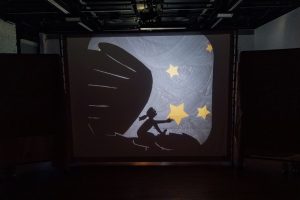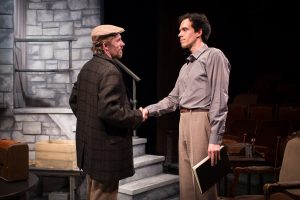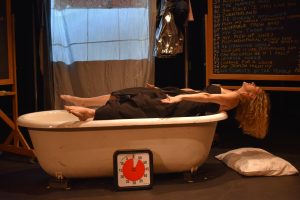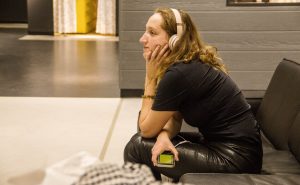
“I wanna get married/ Yes, I need a spouse.” A recording is played. A woman sings those song lyrics without irony. Sara Juli is flitting about in her bathroom. She is briefly jarred back to reality when she notices the toilet seat is up. This Burnt-Out Wife puts the seat down. The song continues. “I wanna get married/ That’s why I was born.”
When Ms. Juli announces “let’s do some more heteronormative bullshit,” you would be advised to put your slippers on and join her in this sanctuary. Described as a “pepto-bismol-pink” bathroom, all the usual fixtures are represented. A bathtub in which to relax with candles. A toilet, a shower and a clothing rack. A couple of dolls left on the floor. Obviously the children were here earlier.
The wife looks in the mirror to perform some heteronormative tasks. She begins plucking her eyebrows. Then she notices hairs in other places, remarking, “that’s unexpected but you’ve gotta do some maintenance.” Further inspection will elicit a “WTF!” From the start, Sara Juli is on edge. This Burnt-Out Wife is going through the motions but there is a lot on her mind.
How does one feel after seventeen years of marriage? A few thoughts emerge such as bored, lonely, questioning and curious. Things do get very serious in between the jesting about her life. “What if I told you I didn’t want to be with you anymore?” That zinger portends the depths of analysis which will follow. No topic about the current state of affairs with her husband is off-limits. The show is real, raw, funny, provocative and, despite the comedic shield, introspective and genuine.
The bridal dream of walking down the aisle is invoked. The bouquet is a plunger. This fantasy is soon replaced when reality hits. She tells the story of receiving a text from her husband. “We need more toilet paper.” Her response back? “We need more post-coital cuddling.”
This pink bathroom becomes her fantasy showcase in which to ponder the state of her life, perform comic monologues with a hairbrush and use dance movements to illustrate her feelings. Behind the safety of an imagined locked bathroom door, this burnt-out wife is brutally honest with herself and her audience. Her defenses are fortified but vulnerability is always apparent.
Since there is a real audience rather than just an imaginary one in the mirror, Ms. Juli is able to engage in some dialogue with them. A question and answer section is used to debunk the childhood fairy tales of happily ever after. One man is asked if separate floors would be a better living arrangement if they were married. “Definitely” was his response.
“What if…” is a game which can be played in everyone’s mind. In her show, Sara Juli directly addresses those thought bubbles which usually remain unspoken. “What if we could have a one night stand while married to other people?” A man answers, “I’d do it but I’d be a little troubled.” She smiles and comments that, regardless of being troubled, he would do it anyway. Funny. Then the big ad lib lands. “Let’s talk after.”
This one hour show is a delightful blend of comedy and serious without ever dipping into negativity. The performance and the script stay focused on laughs despite the realness of the subject matter. You could imagine a darker version. The color pink, however, keeps the tone cotton candy sweet and playful. That base allows the “wow” moments to stand out.
Sara Juli has been creating and performing comedic dance-theater for two decades. Her ability to hold an audience’s attention with abrupt changes in style reflects that experience. The creative elements around her are excellent. Pamela Moulton’s set design would make the Pink Ladies from Grease swoon. The costume designs by Carol Farrell are especially memorable. Disposable razor blades as fringe feels fashion forward. Never worry should you need a quick touch up.
A variety of enjoyments are scattered throughout this piece of performance art. My favorite section came toward the end. Ms. Juli seemed to be holding herself together. A dance begins. This is what the little girl wants. This is what the mature woman needs. Her deliberate and repetitive movements tell the story of the passage of time and life’s changes in direction. This burnt-out wife is paying attention to her cravings. Amidst all the zaniness the message was loud and clear.
Burnt-Out Wife is playing over two weekends at Dixon Place through February 28, 2020. Sara will be touring with this show into 2021 and those locations are listed on her website.











You must be logged in to post a comment.